Kingdom of America
Structure
Culture
History
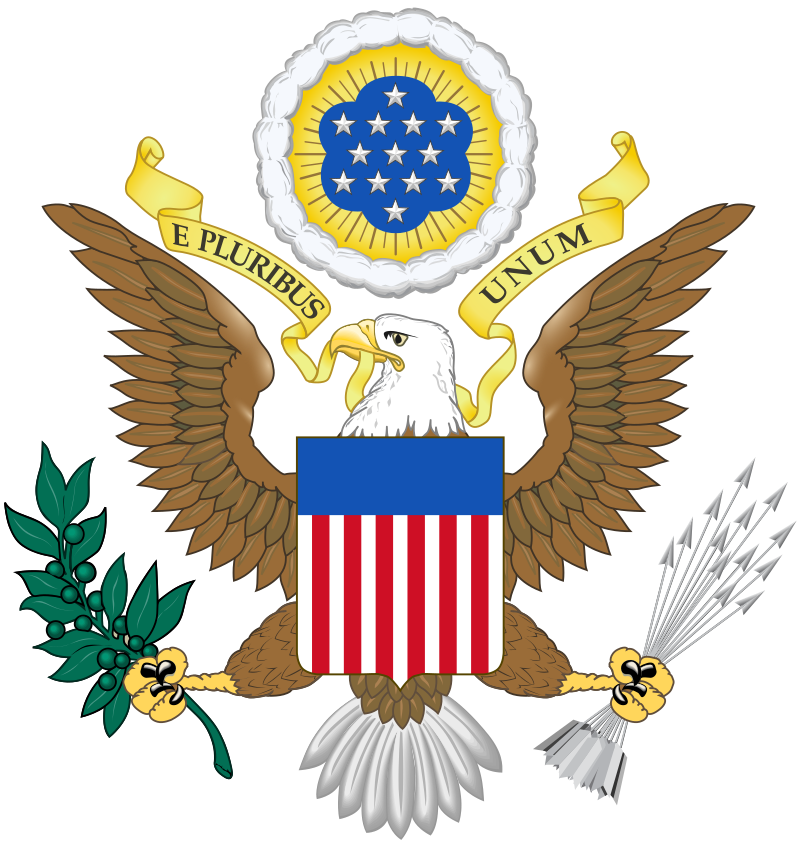


Shays’ Rebellion begins, highlighting the need for replacement of the Articles of Confederation. Nathaniel Gorham proposes the establishment of a monarchy. Anti-British sentiment in the United States eliminates Prince Frederick from the running. Baron von Steuben nominates Prince Henry I Hohenzollern of his native Prussia. Gorham enlists the help of Alexander Hamilton, who uses his influence to garner political support for the idea and begins to use the printing press to sway public opinion, while Baron von Steuben personally is sent to deliver the proposal to Prince Henry.
Hamilton begins to use the Federalist Papers to continue arguing for a monarchy. Of the other two writers, John Jay is convinced while James Madison still remains fringed, but argues that if the idea were to be adopted, it ought to be a constitutional monarchy. Public opinion is swayed into electing delegates approving the concept to the Philadelphia Convention. With Jefferson out of the country, serving as Minister to France, Republican ideas are not as shared so fervently as monarchical. However, a compromise is met to allow for a joint-executive branch with a monarch and an elected official.
John Adams abruptly nominates George Washington, without the latter’s prior knowledge, but this succeeds in gaining support. Debates cause the adoption of the Constitution to be delayed until spring of 1788.
Prince Henry arrives in the United States. Supporters have him speak at one Convention meeting, and his humility gathers more delegate support. Jefferson also returns, years ahead of our timeline, in order to protest, but is too late before the Constitution is finished and ratified by late in the year. The vote for adoption barely succeeds, and hinges mostly on Hamilton’s deal making and Washington’s nomination to the Office of the Chancellor of America. Jefferson begins to rally support around republicanism, but is unable to gain enough in the Convention. This creates a political faction that sets the framework for a party.
George Washington hesitantly accepts running as first Chancellor after days of private conservations with Prince Henry. Washington’s campaign is as symbolic as it was in our timeline, winning the election unanimously. Even those on the edges of acceptance find little to argue against the appointment. Washington’s support for Prince Henry continues to sway opinion, and the Prince is eventually accepted by the majority of the American population. The United States officially becomes rebranded as the Kingdom of America. Congress is divided between the Senate and the Assembly.
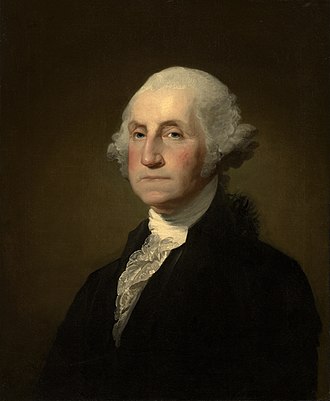
George Washington is sworn into office in New York, while the now King Henry I is coronated in Philadelphia. Having been inspired much by Washington, the coronation is much more conservative than European counterparts, and is instead similar to the swearing in. Even the crown was designed specifically to be much less extravagant than European counterparts, such as St Edward’s Crown.
The majority of the advisory staff are formed into the Executive Cabinet, with the Chancellor as the chairman. The Chancellor becomes the appointer of all cabinet members, with the exception of the Secretary to the Monarch, though the appointments require approval of the King before going to Congress for confirmation. The King becomes the Commander in Chief of the armed forces. As such, the King is authorized to give commands to personnel, but cannot give field orders.
With the administration now established, Washington’s appointments are Secretary of Treasury Alexander Hamilton, Secretary of the State Thomas Jefferson, Attorney General Edmund Rudolph, and Secretary of War Henry Knox. King Henry I appoints Secretary to the Monarch Nathaniel Gorham. John Adams is selected to be the President of the Senate.
During this time, contention fills the Executive Cabinet. Jefferson’s temperament distances many state governors from his efforts. Continuing that, the French Revolution sees him as the sole supporter of the Republican Revolutionaries in the Cabinet. This backfires as a similar uprising occurs in what would be Tennessee under the belief that the newly established government and monarchy are too supporting of Britain by refusing to support France against them. The uprising is led by ambitious visionary Andrew Jackson.
King Henry dispatches troops only in defensive positions around effected townships, rather than aggressively hunting down the rebels. Once under custody, King Henry issues pardons for all involved, with support from Washington. This sways public opinion against the rebels, and Hamilton’s papers show the King as a protector rather than an aggressor.
Hamilton’s economic policy is hindered some by this, but Jefferson’s coalition against it is weakened by recent events. Once passed, King Henry establishes permanent trade deals with Prussia and the Netherlands, but urges caution with trade to the French.
Baron von Steuben is announced as Prussia’s first diplomat to America.

A permanent capital of the nation is established, named Columbia. Plans are made for construction of the Congressional building, Presidential mansion, and the King’s palace. Once again, King Henry calls for the building to be scaled down from that of European ones. King Henry I's temperament as a humbled monarch sees continued support, and relations between the Royal and Chancellery Cabinets remains cordial with exemption from Jefferson. Jefferson openly refuses to address Henry as monarch, referring to him only as “The Prussian”.
After the Tennessee Rebellion is put down, Hamilton uses the opportunity to bind it and the French Revolution to republican ideas and straight to Jefferson. King Henry voices frustration on the reliance Americans have on militia, seeing them as not only ineffective in the Tennessee Rebellion and the Northwest Indian War, but as not accountable to a higher standard of conduct. The King issues the development of a more professional federal force, using Washington’s recommended commanders. This sees the formation of the Legion of America.
King Henry also orders the designation of an Officer Drill School, later the American Royal Military Academy (ARMA), for the training of an effective and competent officer corps. Legislative pushback is minimal. One of the larger questions is whether it is a domestic matter or an international one, but as it was done with the assistance of Chancellor George Washington, it is designated a joint effort. Funding for such matters becomes controversial, as trade is loosened with Britain and the Canadian territories, further tarnishing relations with France and angering the diminishing voice of American Republicans. Britain also lessens, and eventually ceases, funding and support for Native Americans in the Ohio area, urging them to sue for peace.
The island of Haiti becomes engulfed in a slave revolt, with Washington and many in Columbia seeking to aid suppression for the sake of stability. However, King Henry is reluctant to send aid to the Haitian white government, seeking a non-interventionist approach. The King argues military attention should remain on the Northwest, that Saint Dominique is a “colony matter of a foreign power.” Lack of cohesion with the Executive is mirrored in the Legislative, as both Houses of Congress debate the course of action.

Due to public and government pressure, Jefferson resigns to be replaced by Rudolph. Jefferson’s political career never fully recovers. Madison instead becomes the de facto leader of the American Republican faction, though is unable to win as much of a Congressional control as Jefferson had. Therefore, many of Hamilton’s later proposals are able to be passed, including increased development of machinery and allowing women to work. However, many of his other plans fail, such as child labor introduction.
King Henry I finalizes his inspections of many militia units and is not impressed. He begins to consolidate the Armed Forces into a federal service, further diminishing local militias, and fundamentally changing the 2nd Amendment. Rudolph uses the position of the State Secretary to position the Governors into sending State and Territorial militia funding into a Federal Defense Budget. Many local state and local militiamen are simply formed into federal forces, receiving greater training and discipline. However, militia leaders are often replaced by federally selected commanders.
The Northwest Indian War begins to turn in the American’s favor, and atrocities and war crimes bring far more severe punishments. Britain becomes increasingly neutral in the conflict, but offers asylum to Native tribes resisting America. By the end of the year, most of the Indian Confederation has either surrendered or fled westward.
Publicly, the government remains neutral in the conflict in France, while privately Hamilton calls the Revolutionary Republic “illegitimate”. The Republican Government of France is less enthusiastic towards American relations, as relations with Britain become stronger and America refuses support for colonial slave revolts in the West Indies.
The American Mint is established, with King Henry and Chancellor George Washington adorning much of the currency.
Congress passes the Acts of Conscription. This requires that all free men, upon the age of 16, be required to serve a term of at least three years in the Federal military. Those 19 to 21 at the time of signing must serve at least two. Those older must sign for a Federal draft. This Act see much bipartisan approval, as Federalists see an increase in power to the Federal Government, and the Republicans see it as an anti-British advancement in the Northwest Territories.
The revolution in Haiti terrifies the delegates from southern states. Efforts are made in Congress to overturn legislation concerning treatment of slavery, arguing leniency would eventually lead to slave revolts on American soil. King Henry is forced to make a statement, lending his support to retain the laws. In his remarks, King Henry states belief that fairer treatment of slaves would lead to less bloodshed between races. Anti and pro slavery factions emerge in Congress.

With the execution of King Louis of France, America announces the event as voidable of all trade limitations, causing further diplomatic relations with Britain. King Henry I refuses to take sides with the growing European conflict and tensions between France and Britain, though removes the delegates to Paris for security reasons. This is largely seen by the French as a protest to Republican ideology, but is praised by the British.
Washington’s view of slavery being legislatively limited and ended comes into the public from insistence of King Henry. Washington still never pushes a full abolitionist agenda, but is more persuaded to limit it with the vetoing of the Fugitive Slave Act. Passage is eventually achieved with a compromise to include regulations on treatment of slaves, banning practices such as execution of slaves without judicial consent.
The Northwest Indian War has largely ended. King Henry negotiates the Northwest Territory under the control of America, though the western half organized into Native populated area. In a controversial move, the King allows for the Natives to police the territory themselves, punishing illegal settlements from Americans, but also the British. American controlled forts west of the Ohio River and east of the Mississippi River are granted to native warriors, under the conditions to be partially maintained by American commanders. Reparations are paid to tribes disproportionately destroyed during the conflict. Ratification of the treaty was difficult in Congress, only successful after arguing better relations with the Natives would be required to force the British out of American territories. This area would go on to become the Huron Territory.
In the later months of the year, Washington wins re-election for Chancellor of America.

While both Executive heads sought to remain out of the War of the First Coalition, the increase in piracy and lack of security for American merchant vessels causes King Henry I to reinstate the US Navy. The Maritime Security Institute, later the American Royal Naval Academy (ARNA) is first established as well.
The Jay Treaty is also negotiated, with more concessions being granted to Native tribes in order to garner their support against the British. British-American relations begin to ease, as well as Native relations. The British formally remove all troops from the Northwest Territory. Negations with Spain begin in order to open the port of New Orleans, needed to increase American trade in order to afford the growing military.
However, increased enforcement of tariffs targeting distilled spirits cause yet another insurrection. Resentment towards the tariffs had been unpopular since the signing in 1792, but hostilities turn violent. Washington and Henry both personally lead a federal force against the insurrection. After meeting with the rebel leaders, all are arrested without conflict to once again be pardoned several months later. This increases not only the popularity of the Federal Government as a whole, but also instills voting for Madison’s Democratic-Republican Party within the frontier as opposed to armed rebellion. Hamilton is able to direct this conflict towards the Republicans, a sentiment that becomes voiced by Washington as well. King Henry chooses to not comment on blame, only urges unification under a single national identity.
Congress is able to pass the Slave Trade Act, denying American vessels to participate in the International Slave Trade, and banning slave exports from States. King Henry sparks outrage when he publicly states that he views slaves as people first, property second.

The Jay Treaty is fully ratified, inflaming tensions with France. France’s Republican government recalls its ministers from America in protest. Britain begins submitting rumors and propaganda against American officials, claiming to be in league with the French Republic, particularly those who were against the treaty. Homeland Secretary Randolph is hit hard, as it is revealed he moved to undermine American, and ultimately King Henry’s, governing competency and seemingly taking bribes from the French Republic. Randolph resigns in disgrace, and Hamilton further ties the ideas of Republicanism to French allegiance.
Southern states grow resentful of the treaty, but Hamilton is able to convince many that major political opposition is directly funded by the French to undermine American sovereignty, though the impact is marginal. This, coupled with France’s abolition of slavery in their constitution begins to sway southern opinion to anti-French. James Madison’s control of the Republican Party begins to wane as his stance of anti-Jay Treaty, pro-French revolutionaries, and defense of the institution of slavery become cemented as party platform.
An abolitionist segment of the Republican Party, being known as the Liberty or Libertarian Party, begins to take form.
The treaty solidifies a border between the American Kingdom and the territory of Upper Canada. With the removal of British forces from the Northwest Territory, King Henry appoints a delegate to the Indian Confederacy, informally recognizing them as an independent nation. Opposition is fierce to this decision, as it is believed it would disrupt settling of the area. Supporters argue it is necessary to avoid another war. Chancellor Washington orders governors to the rest of the territory.
Hamilton resigns his position as Secretary, though remains a prominent supporter of both the Chancellery and the Monarch, writing essays and speaking lectures.

The 4th Congress is elected, with the Federalist Party retaining a majority in the Senate, while also being the party with the most seats in the Assembly. However, the Libertarians and the Republicans combined have the majority. This three way split of the Assembly causes compromises in most legislative matters. Federalists and Libertarians begin to work on legislation to prohibiting the expansion of the institution of slavery.
A slave revolt begins in the Carolinas, being inspired by the lack of suppression of the Haitian Revolt and causing hysteria among Southerners. The revolt prolongs for more than a month before being suppressed by the local military. Memoirs of the rebels written by supporters are posthumously made public, bringing to light many of the conditions that slaves endure. Abolition movements grow in numerous states, and boycotts of slave produced goods begins.
The War of the First Coalition begins to come to an end, with many European nations either exiting or switching sides. Support for France in America continues to decline, for various reasons. France begins to target American merchant vessels, sparking cries for war.

King Henry I sends delegates to Paris in order to ease growing tensions. These negotiations fail, as the French diplomat demands bribery and payment before negotiations proceed. The public outcry is immense, as the French Republican Government is seen as a violent and greedy institution. King Henry addresses Congress, stating that diplomatic measures might have been exhausted.
Chancellor George Washington announces he will not seek re-election for a third term. The campaign is split three ways, with John Adams running for the Federalists, James Madison for the Republicans, and Elbridge Gerry, one of the failed diplomats to France, for the Libertarians.
War of the First Coalition comes to an end, though Congress denies trade relations with the new Republic. Public opinion has peaked against France, and relations with Britain has quietly improved. Merchant ships begin conversion while construction of American frigates conclude.
John Adams is elected Chancellor of America.
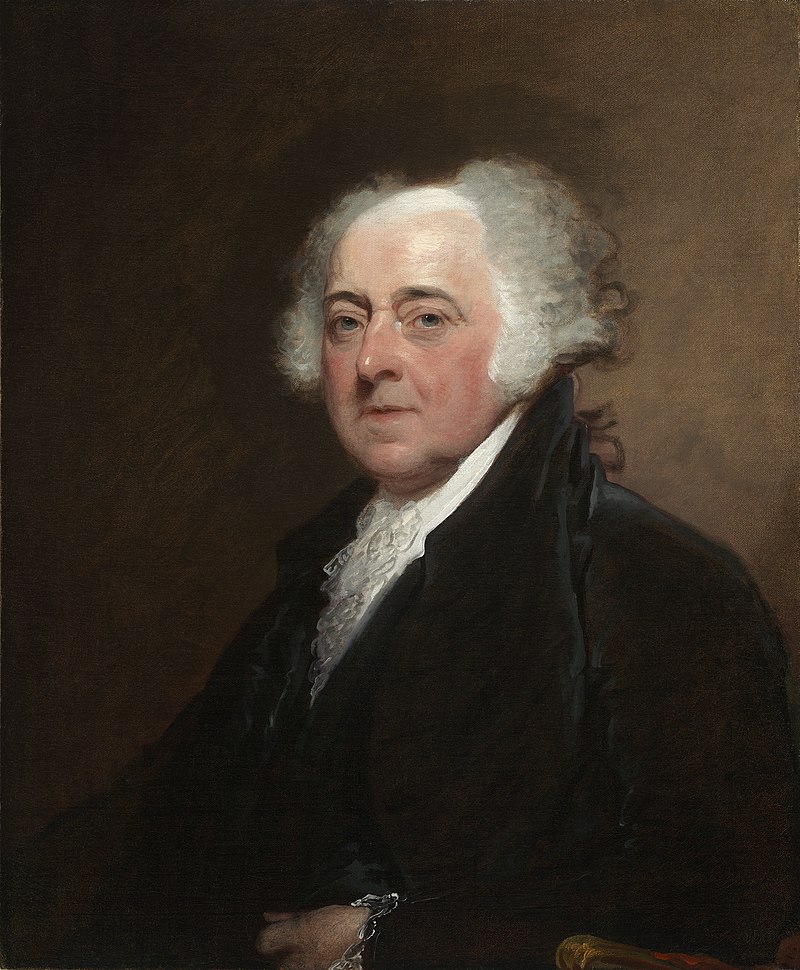
Diplomacy with France has officially failed. American shipping lanes are targeted by French privateers. King Henry I meets with Chancellor John Adams, and though the latter is reluctant at first, the two address Congress for approval on a formal declaration of war. In May of 1798, Congress approves, and conflicts begin rapidly in the Caribbean.
Later in the year, Britain and another European coalition also declare war on France. America never officially becomes a member of the Coalition. Relations with Spain is hindered as Spanish ports in the Caribbean and Florida offer port to the French Navy. Anti-British immigrants begin to protest the Franco-American War. In reaction, Federalist Congress passes the Alien and Sedition Acts, greatly diminishing the party’s popularity and receiving condemnation from the King.
A statute barely passes Congress, prohibiting the slave trade in the Mississippi Territory. Relations between the North and South sour further. Regardless, Georgia legislation bans importation of new slaves.
Washington passes away, with King Henry declaring a day of mourning. The monarchy formally funds funeral processions, holding a wake in the newly completed Royal Palace setting a precedent going forward. Henry personally pays respect the Washington, and reads an impassioned speech dedicated to the victories of Washington’s life, adding to his popularity. Many demand the construction of a mausoleum, but King Henry orders that Washington’s will be respected and his remains be buried at his home at Mount Vernon. He does, however, agree on a memorial.
Britain seeks a complete end to endorsing Native rebellion against America as the two powers become more amicable as they fight the French. In the years since the Jay Treaty, American officials sought to retain positive relations with the Natives in the area. This is bolstered tremendously by the now depletion of the largest anti-American funding. Native controlled forts allow for the area to be maintained and policed, medical and technical advances increase Native quality of life, and mutual military cooperation allows for local alliances. Natives are trained and drilled in modern European warfare, and Americans learn the fundamentals of Native based guerrilla tactics. This sees the formation of the Pathfinders, later formed as the Army Rangers.

The war with France swings in America’s favor. Most altercations see the American Navy seize many French vessels. Using this tactic, the American Navy triples in ship size. Most of these are held as ransom in order to secure American priorities after the war. Spain closes off its ports to France after King Henry I threatens closing the Mississippi River to Spanish trade ships. Stuck between the American and British Royal Navies, Spain ceases support for France in the Caribbean, while supplying forces on the European continent. King Henry rejects calls for armed conflict with Spain, claiming France as the primary threat.
The king, age 74 at this time, grows worried about his ailing health and sends word to Prussia, requesting the presence of his younger brother, Prince Augustus Ferdinand, in order to secure succession of the crown.
Napoleon Bonaparte becomes First Consul of the French Republic.
A resolution passed both houses of Congress, and sent to the states to ratify, that would allow the Chancellor to appoint the President of the Senate as opposed to being the runner up for the Chancellery. This is in response to James Madison being the President, despite low approval of Federalists and Libertarians, who combine hold a super majority in the Senate. This eventually becomes the Twelfth Amendment.

Napoleon seeks an end to the war with America and enters negotiations. American demands of reparations are denied, and King Henry refuses any treaty excluding them. Britain wishes America to continue the war so as to help weaken the French Navy during the War of the Second Coalition. In an address to both nations, Congress and the Office of the Monarch issues ultimatums. If France wished to end the war, they must pay back the reparations. If Britain wished to continue the war, they must end all impressment of American sailors and release those in custody. Impressment had been radically scaled down in the years, but still continued on limited vessels. Britain is the first to accept terms, and thus America harasses French vessels to its various colonies in the West Indies.
A consulate is sent to the island of Saint Dominique. Trade relations are established and a military presence is stationed on the island. This hinders Napoleon’s hopes of colonial restoration and kickstarting talks of Haitian independence.
In the Congressional elections, states such as Kentucky, Tennessee, and many of the Southeastern States become strong Republican controlled areas. The Federalists and Libertarians form a coalition with regards to the issue of slavery. The Federalists maintain a stance of industrial reasoning, while Libertarians enact moral reasons.
New laws prohibit American sailors in participating and financially benefiting from the slave trade.
Prince Augustus Ferdinand Ferdinand arrives in America. Among those joining him are his wife, Elizabeth Louise, and his sons, Princes Louis Ferdinand and Augustus . King Henry I announces to Congress his naming of Augustus Ferdinand as his successor. Debate begins in Congress, as the Federalists do not have the required votes themselves to secure approval of the succession.

Napoleon finally concedes to the demands of reparations. Though America does not secure the $20 million demanded, they are officially freed from . Many Federalists do not accept the terms, but are too few to oppose them.
Wishing to have the succession secured, the Federalists agree to the terms, as well as agree to allow the Alien and Sedition Acts to expire, in a coalition with Libertarians. Upon the approval of the succession, King Henry I abdicates, and Prince Augustus Ferdinand is announced as King Augustus I.
John Adams reputation is extremely tarnished, and is convinced to not seek re-election. The campaign for Chancellor of America is ran by Libertarian Aaron Burr, Federalist John Marshall, and Republican James Madison. John Marshall secures the most votes, though not a majority, by the closest margins in American history up to that point. He does so only after selecting Elbridge Gerry as running mate to split the Libertarian vote, and Madison only gaining electoral votes in Tennessee and South Carolina. However, Libertarians become the largest party in Congress as the Federalists are increasingly viewed as aristocratic and elitist.
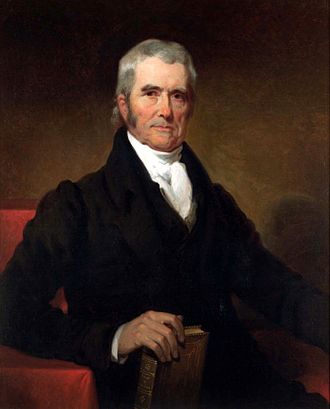
Chancellor John Marshall quickly enacts an executive order blocking enforcement of the remaining clauses of the Alien and Sedition Acts, and pardoning all those prosecuted under it. His standing with Libertarians increase.
Elbridge Gerry begins to formulate a larger power to the office of the PotS. He removes the standing rule of disallowing the position to engage in and direct debate, force a vote on legislation, and brings a more hands on role in Senate duties. This move is controversial, but allows for the Marshall-Gerry objectives to be passed more quickly.
Formal Coronation of Augustus I takes place, and shortly thereafter former King Henry I passes away. A large funeral is held in his remembrance.
Prince Louis Ferdinand is proclaimed the first Crown Prince and Heir Apparent. Both Princes contribute to the arts as well, bolstering the Royal American Cultural Archives, as well as visit and inspect both military academies. From this, moderates from the Libertarian and Republican parties grow in approval of the increasing Royal Family.
For leadership during the war against Napoleon as the first war America had fought, King Augustus grants John Adams the Dukedom of Massachusetts.
In keeping with cooperations between the Federalists and the Libertarians, Marshall recommends James Monroe to the appointment of Diplomat to Britain, seeking to secure better North American continental relations against France and Spain. During a meeting between Marshall, Monroe, and Augustus I, Prince Augustus meets Elizabeth Monroe and becomes impressed with her intelligence and mannerisms. Eliza reciprocates, and the two begin a courtship. James Madison is accepted to the position by Augustus I.
Military actions begins against the Barbary states as piracy becomes an increasing issue in the Mediterranean. American naval power continues to be respected on the world scale, though its size and capability is still dwarfed by that of the European Great Powers.
Marshall seeks to pass infrastructure bills to construct national roads and canals to further increase trade income, but the low number of supporting Federalists in Congress makes it difficult. A deal is made with the Libertarians to pass the bills in exchange for support repealing the mandatory military service. The draft, however, remains in place.

The first American Royal Wedding is held between Prince Augustus and Elizabeth Monroe. The event is coordinated between King Augustus I and James Monroe. Augustus I has concerns about an American royal marrying a commoner, believing the Prince should marry someone of European royalty to strengthen the position. Monroe argues that marrying an American commoner strengthens domestic connection to a young nation. Augustus I reluctantly gives consent for the marriage.
Crown Prince Louis Ferdinand becomes vocal about relations with France upon the establishment of the new French Empire, garnering support for anti-French war-hawks in Congress front the Federalists and Republicans. After the denial from Congress and his father to enter the new War of the Third Coalition, Prince Louis Ferdinand takes a group of his guard, secretly meets with American Calvary, and enters the Louisiana Territory. During an ambush of a French patrol, Louis Ferdinand is killed. Though the action becomes very controversial, the act of killing a member of the Royal Family pushes the majority to support retaliation. After public pressure increases, John Marshall and Augustus I address Congress, and a declaration of war is passed.

The war against Napoleon resumes as America uses its position to foster rebellions in Spain's South American colonies. America also invades the territory of Louisiana, wishing to take the Port of New Orleans for itself. Crown Prince Augustus is barred from active combat in order to prevent the death of another Crown Prince. This precedent is implemented legislatively for future generations.
Thomas Jefferson recommends his friend, Meriwether Lewis, to scout the remaining parts of the Louisiana territory in order to assess military control of the region.
The right to vote is proposed by the Libertarian Party to all men of America, removing the clause of land ownership. This causes controversy as the Republicans wish to bar black Americans from the right to vote. A constitutional amendment is proposed.
Prince Augustus and Princess Elia welcome their first child, William.

The American Navy sees its first deep water Atlantic victory when a squadron of American ships met a Franco-Spanish fleet sent to reinforce the West Indies. Though outnumbered, the American ship engineering allowed for the Americans to prolong the battle until the Royal Navy joined them, turning the battle into a decisive Anglo-American victory.
After which, France abandons all efforts in the New World. This battle also cuts Napoleon’s fleet significantly, allowing for an easier British victory in Trafalgar. The threat of a French invasion of Britain is then drastically reduced, allowing the Royal Navy to assert control on the surrounding seas. America has more mixed results against Spanish ships in the Caribbean, but is able to garner a larger number ships-of-the-line, thus creating a more powerful American Navy. For his efforts, Commodore Stephen Decatur, the American commander, is promoted to Admiral and given a large amount of decoration.
The Thirteenth Amendment is ratified on the barest possible margins, granting the right to vote and hold office to all born free men, removing the land ownership clause and extending the right to outside the white race. The stipulation is agreed upon that both parents must have been born free as well. Outrage in the southern states increases, and look to the new gains in Florida to expand the slave trade.
The American control to the port of New Orleans, coupled with the expansion of national infrastructure, the American economy increases.
Pro-French aggressors from Lower Canada increases in New York and Boston, causing tension between Americans and French Canadians.
Radical Libertarians and Republicans join into an anti-monarchy caucus, but sees them ineffective as they argue over the issue of slavery. Federalists reform their party position, with moderates from the Libertarians, and form the Unionist Party. Their new position is to extend the economy of America, maintain a strong military, and extend American foreign prestige. While slavery in contested within the party, and many see it as a moral evil, the main party leadership lean towards it being an economic one. Republicans become increasingly defined on their pro-slavery stance or defense of slavery as an institution as most other issues take a secondary position among the support base. Libertarians become the party of radical abolitionists, but the role of the federal government and regulations remain debated.
Elbridge Gerry wins election as Chancellor as John Marshall wishes to retire.
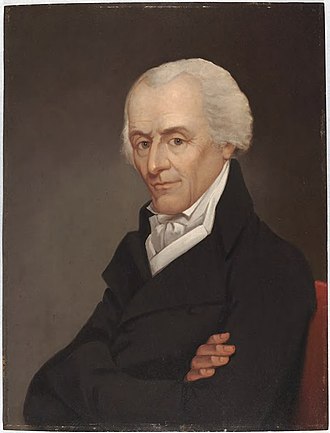
With a series of political defeats, the Republicans grow more aggressive. A faction led by Nathaniel Macon begin to consolidate power in southern states, beginning talks of secession in opposition to Chancellor Elbridge Gerry's emancipation plans.
Chancellor Gerry announces a vote on full and complete abolition of slavery by 1810, the earliest that would be allowed under the Constitution. The office of PotS has changed to Premier of the Senate, or Premier for short. Gerry’s pick for the office, William Short, plans to force the vote. King Augustus I supports the plan, and both cabinets begin proposals for after the vote. In order to secure the effort, Gerry asks John Marshall and Peter Augustus Jay to the Supreme Court, attempting to have all three branches in agreement. Both men agree, with Jay’s nomination being approved with little attention. Marshall’s approval as Chief Justice receives significant opposition.
While the war in Europe continues, France and Spain sue for peace in the Americas. In exchange for removing occupation of South American and Caribbean colonies, allowing for commerce and government to resume, France and Spain cedes all of Louisiana and Florida to America. King Augustus I of America himself, accompanied by Crown Prince Augustus, negotiated directly with Napoleon and Charles IV of Spain, marking the first time a European monarch discussed directly to an American one. Augustus I would be later given the moniker Augustus the Conqueror.
With the end of the War of the Third Coalition coming to an end in Europe, Britain’s attention is split between continued conflict with France and the newly ignited opposition to the American annexation of the entirety of Louisiana. King Augustus I expresses that the situation is "a concern for the American Crown, not the British one". The disagreement, along with British inadequate response to growing pro-French tensions in Lower Canada, plays a major role in the eventual refusal of America to participate in the Fourth Coalition.
Princess Elizabeth Monroe draws criticism and minor accusations of French sympathy after naming her newly born daughter Hortensia after Hortense de Beauharnais, step-daughter of Napoleon Bonaparte. Matters are complicated further as Hotense's husband, Louis Bonaparte, is made King of Holland by Napoleon. Prince Augustus, however, uses his wife’s connection to establish a correspondence with King Louis I. This sets the groundwork for Holland joining the opposition to Napoleon.
The states of Georgia and the Carolinas declare revolt as the abolition vote fails to be blocked in Congress. Virginia and Tennessee see many counties join them, but with their state governments controlled by Libertarians are able to keep the majority within the kingdom. The rebel militia attack military outposts, seizing weapons and munitions. King Augustus calls for military action to put down what he feels as little more than an insurrection.
Napoleon creates the Confederation of the Rhine. King Augustus I denounces this action, and announces support for Prussian resistance. Congress voices concerns in increased involvement in European affairs.

The federal army has engaged rebel militia on a few occasions, emerging as the clear victor in most. The Bill for the end of slavery is altered greatly in the wake of the crisis. The alteration ends the import of new slaves into the country, and ends the sale of slaves throughout the admitted states, but not the ownership of those already enslaved. Premier William Short forces the vote, taking advantage of rebel senators’ absences. The notion passes, with Chancellor Elbridge Gerry signing into law. No firm plan for the recently freed slaves had been emplaced, with many ranging from assimilation to reparation.
Rebel militia prove to be ill effective. By the end of the year, nearly all rebel militias are defeated, either routed or captured, in the states of Virginia and Tennessee. Government officials that supported rebel efforts are forced to resign. Domestically, Gerry and Augustus I are heavily criticized for their aggressiveness towards the insurrections. Many cabinet and military officials resign out of protest, many believing the efforts were immoral or supported the rebel efforts. Abolition papers and Libertarian speakers attempt to paint the rebel leaders as fanatics gripping to what is increasingly seen as an outdated form of economy and agriculture. This sees mixed success, and many of the public view the situation as the Federal Government’s inability to govern. Rebels use Pro-French Canadians and Spanish Caribbean forces to get supplies. This fuels anti-French and Spanish sentiment among the Unionists and Libertarians.
Prince Augustus is able to gain a report with Louis Bonaparte, now called King Louis I of Holland, as he is able to play on Louis’ desire for independence from Napoleon. While this eases tensions from opposition towards the monarchy, many Americans begin to protest engagement in European wars. However, Prince Augustus effectively takes over the role of Commander-in-Chief from his father, as August the Elder's health begins to decline.
Prince Augustus and Princess Elizabeth Monroe welcome their third child, Prince John, or Johan.

The slave trade within America officially has an end date. However, a solution for afterwards is not yet settled, as many black Americans remain in the custody of slave merchants. The prevailing proposal is to send them en masse west to cultivate territory within the lands west of the Mississippi River. Another is the repatriation to Africa, but this is seen as too costly. With no agreed solution on the federal level, very little integration is formed throughout the states, north and south. The freed slaves become instrumental to ending the revolt against abolition. All those captured are imprisoned.
With the expulsion of King Ferdinand VII of Spain, Prince Augustus goes to London to meet with him and Prince Frederick of Britain, along with delegates of King Charles XIII of Sweden, King Louis I of Holland, King Frederick William III of Prussia, and Emperor Francis I of Austria. The meeting is to discuss the formation of a new coalition against France and Napoleon. It is decided that Spain would support the British forces in Portugal, while the British sent a second force to Holland, supported by America, to unite with the Dutch. The Swedish would come from the north to support Prussia against the Confederation of the Rhine, while Austria would go south against Italy. It was believed so many fronts at once would spread Napoleon’s forces too thin, allowing the allies to push through. The Fifth Coalition is established.
Prince Frederick guarantees Britain’s withdrawal of denouncement against America’s annexation of Louisiana in exchange for American support. Prince Augustus does not secure the same promise from Ferdinand VII in regards to Florida. Though Chancellor Elbridge Gerry and King Augustus I approve of the battle strategy and Congress agrees to declare war in support of the Coalition, much of the government and public opinion begin to voice exhaustion from military conflict.

American and British forces land in Holland as War of the Fifth Coalition begins. Under the supreme command of Sir John Pitt, the combined forces are able to withstand the superior French army. This is managed by flooding the surrounding area, causing difficulty with French cavalry and artillery. Though Napoleon himself is successful in Wagram, the defeat of his marshalls in Antwerp causes a stalemate in the war. All sides sue for peace as disease begins to set in on all fronts. Louis I is seen by the Dutch people as a defender of their liberty.
Elbridge Gerry wins re-election as Chancellor.

Chancellor Elbridge Gerry begins his second term with the end of the American slave trade. Enough slaveholders in the South have fled to slow the cotton trade, as well as many essential crops. The loss of the goods has caused an economic recession throughout the country. Unsold slaves being held by traders face an uncertainty. Most are pressed into forced labor contracts, signing abusive contracts while being greatly illiterate.
Attacks on freed slaves rise. As they are not citizens, they are not protected by American law, and most attacks go unresolved. Even those who entered into forced labor are met with hostilities similar to that under slavery. Under pressure, the Federal Government forces relocation of freed slaves to the area far west of the Missouri River, to the edge of the Louisiana Territory. Efforts are made to move as many as possible, and the move often remains compulsory.
The economic recession has caused issues with that of the Huron Territory. Resources have diminished in availability to the Native allies who have grown in reliance on them. A native leader named Tecumseh has become a voice of increasing self reliance of the Huron Territory. Other leaders such as Little Turtle and Blue Jacket, who once fought the Americans, have grown to argue for assimilation.
King Augustus I is pressured to abdicate for health reasons, but refuses to do so. He argues that the kingdom at this time requires a consistent leadership. Augustus the Younger does take a more active role in the day-to-day governing, including meeting with members of congress to address the national concerns.
In Europe, Napoleon weds the daughter of Austrian Emperor Francis I. Austria agrees to the union in an attempt to keep the alliance between France and Russia from strengthening. Napoleon's Continental System begins to break apart, with Russia and Sweden beginning to break away from it.

The nation is in mourning as King Augustus I passes away and Augustus the Younger is proclaimed Augustus II. The new king promises unification and reforms.
Upper Canada begins to take advantage of the political turmoil of America. Canadian governors meet with Tecumseh, promising arms and ammunition if conflict were to come.
Republican lawmakers soar in popularity with promises of economic stability, becoming powerful enough to legally challenge abolition in the courts.

A new political crisis emerges as Chancellor Elbridge Gerry dies in office. In regards to succession, congress is torn between Premier William Short of the Senate and Speaker Henry Clay of the Assembly. Premier Short eventually assumes the office, causing outcries from political opponents.
Augustus II is officially coronated. In his Precedence Speech, he calls for economic and land reforms in order to compensate for the loss of slave labor. The speech is met with mixed reception. The Unionists applauds it as the sign of a strong monarch, the Libertarians welcome an alternative to slave labor but worry about northern industrial monopoly, and the Republicans rebuke it as continued federal overreach.
The situation in Huron escalates as Tecumseh meets with Governor Arthur St Claire. Tecumseh demands the independence of the Huron territory, despite barely holding a majority of supporters against Little Turtle and Blue Jacket, in exchange for support against the British controlled Canadian territories. St Claire agrees to send the terms to Columbia, but warns the terms may not be agreed on.
In Europe, Prussia signs the Treaty of Paris, believing Napoleon is still largely undefeatable. Napoleon emasses a force to invade Russia and subjugate them once more. The invasion ends in disaster, and the Grande Armee retreats back to Prussia.

The legality of abolition is argued at the Supreme Court. Proponents argue that it was a legal and valid vote as stated in the Constitution, while the opposing arguments point to the economic fallout of the decision. The vote is split 3-2, with Chief Justice John Marshall casting the tie breaker, in favor of abolition. In the words of Chief Justice Marshall, "The inadequacy of preceding planning does not negate the legal questioning of the law." Unionist and Libertarian lawmakers applaud the decision, but the Republicans use it as a rally. John C. Calhoun uses it as evidence of failure of the federal government to rule.
Chancellor William Short offers work incentives for the unemployed in the north to travel south to work fields. King Augustus II attempts to introduce European land reforms, but is stopped based on the Constitutionality of the effort, with domestic issues being under the Chancellor. The Libertarians in power prove to be stubborn, as the Secretary of the Homeland mostly ignores the suggestions. In the end, very few reforms pass, causing frustrations in all levels of American society.
Augustus II receives the terms from Tecumseh and the Huron Territory, but sends back a counter offer. Huron would be recognized as an unincorporated American territory, with Tecumseh as the executive, his council as the legislative, and his settlement of Prophetstown as the capital. Meanwhile, Canadian leaders work to undermine American efforts in the region, and Tecumseh growing in cooperation with them as supplies are more easily acquired.
All of these factors combined allowed for Short to lose re-election, and the Chancellery being won by Republican William H. Crawford.
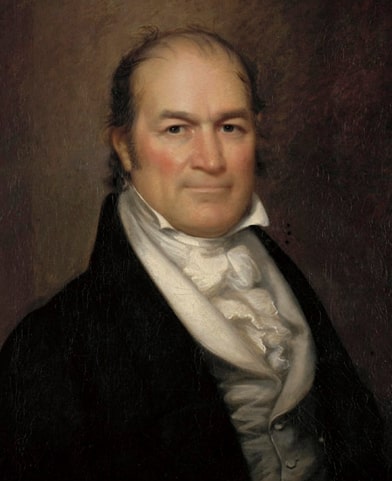
William H. Crawford wins the Chancellery, riding off the back of the recession left by Elbridge Gerry and William Short subsequently. He plays himself as more of the common man's Chancellor, placating to the "hard hit" white population. He further distances his office from that of the king, and attempts to govern solely to the annoyance of Augustus II. He and the Republicans are elected in a wave of new support as the Libertarians are seen as too idealistic and the Unionists too aristocratic. He packs his cabinet with pro-slavery and anti-British politicians of the time, most are at the very least sympathetic of the pro-slavery rebellion about a decade earlier.
While SCOTUS ruled the legislation of abolition was Constitutional, it does not make it to Constitutional amendment. In such, Crawford attempts measures to block further enforcement of it. In the meantime, he implements orders for the spread of American style serfdom and indentured servitude. Crawford extends this to not just the freed blacks, but immigrants as well, particularly from east Asia, but also the Jewish and the North Africans.
This governing causes issues with the natives and the rising of Tecumseh. Tecumseh does not agree with the terms of treaty from the American government in regards to the Huron Territory and furthers negotiations with Canada. This is seen as turning over American territory to the British. Crawford seeks to overturn the previous treaties with the natives and push them out of the territory completely, granting the land to loyal supporters. If he can, he wants to conquer and annex all of Canada. In this measure, he pressures Northwest Territory Governor Arthur St Clair, a Unionist, out of office to replace him with William Henry Harrison, a Crawford Republican.

With Harrison in position, military drills are increased, causing more tensions with the Canadians and Natives until a skirmish occurs. The event is greatly exaggerated by Harrison in order to create calls for war. However, as a declaration of war must be requested of Congress by both the Chancellor and the King, Augustus II refuses to oblige, sticking with the mentality of the Unionists. The feud creates massive riffs in the entire Federal Government. This sees as much support lost for William H. Crawford as Augustus.
Seeing as Augustus does not authorize the mobilization of the regulars, Crawford uses what remains of the state militias to circumvent the King's authority.
With a militia force, led by the previously pardoned Andrew Jackson, the natives are fought in Huron, with Tecumseh's Prophetstown being razed. Following that, a superior American militia force is completely crushed by a smaller force of Canadian regulars. The Americans are routed, and Canadian forces enter the United States.

The Americans see defeat after defeat in the territory against the Canadians and Natives. Much Michigan and Wisconsin fall under Canadian occupation. This is secretly deliberate, as Augustus is attempting to show the inadequacies of state militias and the leadership of Crawford and his officers against that of his handpicked and federally trained ones. This is to diplomatically see the influence of Crawford to drop significantly and swing it towards the monarchy.
Congress grows against Crawford, not only for his handling of the war, but for his controversial domestic policies, especially against the natives. A motion is made years into the war for the king to take executive control of the military actions. Augustus appoints Henry Dearborn as Commander, and for a time personally oversees operations. His plan is to bring conflicts to a swift and decisive end, especially as London has gotten word of the conflict.
With a strong army of regulars, the war swings in America's favor. Tecumseh's army is crushed. The Natives are forced into the terms from the previous proposal, but this time under a governor of America's choosing. Huron is officially incorporated into the Kingdom of America. The American military have retaken territory and begin to occupy Ottawa. Augustus II calls for the immediate surrender of Canadian forces, to which they comply.

Officials in Britain are made aware and land an expeditionary force to their holdings in Canada. America takes no Canadian territory, as doing so would harm relations with Britain. A treaty is signed in which both sides admit fault, America clarifies the conflict was with the Canadian officials and not Britain, and the provisional governments in Lower and Upper Canada are replaced after loss of confidence.
William H. Crawford's term as Chancellor comes to an end as he is defeated for reelection by Rufus King and the Unionists. After years of a tumultuous relationship between the Chancellery and the Crown, the American people demand a more stable cooperation. Augustus II declines to issue Articles of Impeachment, allowing Crawford to serve the remainder of his term and calls for national unity instead. This is influenced by James Monroe.
Andrew Jackson is executed for his part in escalation and repeated military insurrections.
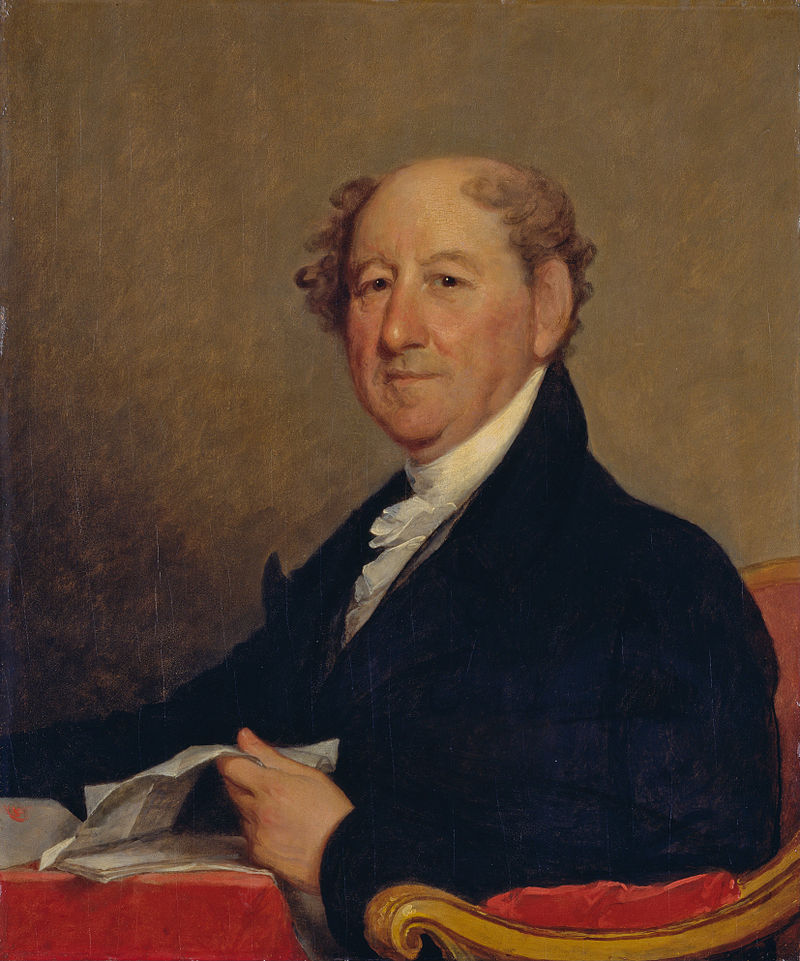
"The federation known as these United States is purposefully led by a dualist Eagle. The Chancellery to embody the ever developing will of the American people. The Crown to embody the consistent spirit of the American nation. Too often has these two been at odds, and the suffering been disproportionately laid upon the innocent citizens of this Nation. The Throne has up to the present been thusly ruled by a foreign head. Upon this day, in the year of our Lord 1818, the Ruling House of the United States will no longer be of Hohenzollern. Lexington is the name wherest the American spirit was first borne, and thus would forever stand as such. Myself, and my descendants hereafter, so long as they reign, shall bear the name Lexington to honor such origins, and henceforth relinquish all titles and holdings within foreign nations. May the Federal Kingdom that is the United States of America maintain a sovereign from their own peoples."

Rufus King is sworn in as Chancellor of America. Together with King Augustus, radical changes are made to the administration of the Executive Branch. Chancellor King pushes for land organization reforms, as well as the construction of a series of roads and canals, including a National Road. These are aimed at increasing trade revenue.
In a speech that was initially planned to call for national unity, Augustus announced the change of the Royal House to Lexington, in honor and commemoration of American history and pride. The proclamation was viewed favorably by American nationalists, particularly among the Unionist Party. While the Libertarians and Republican have positive opinions of the speech, they are more appreciative of the king's re-affirmation to the Constitution.
Vicente Guerrero takes control of the Mexican revolutionary forces and asks America for assistance. America agrees, sending men, weapons, and ships to their aid. Augustus and King argue that a stable Mexico along the American border is beneficial.
Pettion dies in Haiti with a provisional government in place, and his handpicked successor Jean-Pierre Boyer becomes the head.

The charter of the Bank of America is revived, but also amended. This is to regulate lending practices among bank branches and currency in circulation. Inflation from the recession is gradually put under control. By request of the opposition, the Bank is placed under regular subpoena to ensure legal conformity.
Augustus II founds the Royal Academy of Sciences, originally in order to develop agricultural progress. The scientific advances help cushion the economic effects of the decline of slave labor.

Augustus also founds the Royal Order of Notes and Letters. The order is meant to designate "those whose contributions have contributed to American culture". The purpose is to recognise and mature American culture, and those awarded are among the best artisans and musicians in the country. This is universally applauded, though to the degree is varied.
Mexico is successful in their war until the Treino Liberal in 1820 agrees to Mexican Independence. General Vicente Guerrero is at first named Provisional Leader, but public pressure sees him be proclaimed Vicente I, Emperor of Mexico. During the first year of his reign, Vincente I abolishes slavery.

Crown Prince William graduates training at the American Royal Military Academy. While he obtains the commission as a Lieutenant, he is forbade active command due to his rank. Instead, he is made aide-de-camp of an intelligence officer. The king arranged this in order to develop leadership and diplomacy among his heir. William's maternal grandfather, James Monroe, also becomes a source of mentorship. With his graduation, Augustus nominates him as the heir to the throne, and Congress votes in approval.
The American economy begins to improve. With these improvements, Rufus King wins re-election for Chancellor.

King Augustus II recognizes the Latin American countries fighting for independence. Augustus orders the Continental Ordinance, which declares separate spheres of influence between Europe and the Americas. America will no longer accept European intervention in America.
Chancellor Rufus King begins land sales in western territories to provoke expansion and development of further states.
After years of debates, the Territory of Huron is successfully admitted to the Union as the state of Shawnee. The Native tribes of the state successfully argued in the Supreme Court for citizenship and voting rights. The majority position is that it would help assimilate the Civilized Tribes into the culture of the kingdom. The condition for statehood is that the state allows for white settlers to purchase land.

A Royal Marriage is negotiated place between Prince Louis of Holland and Princess Hortensia of America by the close relationship between their mothers. Relations between America and Europe are mixed, especially in Spain, after word of the Continental Ordinance. American finances continue to improve.

Augustus II formally recognizes the Empire of Brazil, and enters negotiations with Pedro I. In order to secure a New World Alliance, a royal marriage between Crown Prince William and Pedro's sister, Infanta Ana of Portugal. Though reluctant, Pedro agrees to support the Continental Ordinance.
Mexico reconfirms abolition of slavery in their constitution.

The royal wedding between Crown Prince William and the now Crown Princess Ana occurs.
Prince John graduates from the American Royal Naval Academy, receiving a commission as an Ensign.
Unionist John Quincy Adams, Second Duke of Massachusetts, wins the Chancellery.
Crown Prince William of America announces his intentions to join the delegates attending the Congress of Panama from Simon Bolivar the following year. He attempts to convince his brother-in-law to be, Pedro I of Brazil, to attend as well, followed by the two travelling together to Rio de Janeiro in time for Princess Ana de Jesus's arrival. Pedro declines to go in person, but sends an observer with the instructions to not make any formal agreements. Argentina refuses to attend out of protest of American intervention in the Cisplatine War.
France demands indemnity from Haiti in return for recognizing independence. With the support of Augustus II of America and Vicente I of Mexico, Haiti is able to resist for some time as France is no longer confident against all three nations.
The dispute between Peru and Argentina escalates into war. Peru invades Alto Peru with support from Chile.
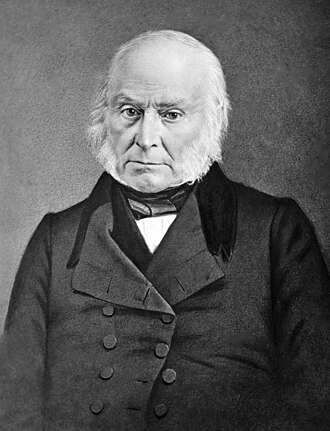
At the Congress of Panama, William is not impressed with the ideas presented. He elects to sign for the trade alliance, but notes Bolivar's ideas for unification are beyond realistic. William and the American delegates sign the trade agreement while refusing to commit to a united military. Instead, William offers American guarantee for the independence of the South American nations. The Americans also unintentionally give insult and stoke existing fears in predicting a King Simon.
While on route to Rio de Janeiro, William ensures American support in Cisplatina, with the battleships in escort being sent further south as fresh reinforcements. William also recommends alliance negotiations with Haiti, but the Brazilian delegate refuses, stating Brazil couldn't make legislation towards abolition, a Haitian requirement for support, just yet. The delegate does note he can negotiate a trade agreement at least. In Rio, William meets his bride, Ana de Jesus. The couple have an engagement ceremony held at the Imperial Palace and spend three months in Brazil before boarding a ship to America.
A united force of America and Brazil defeat Argentina to secure the Cisplatina province. Argentina agrees to peace if both America and Brazil support their right to choose a monarch despite Spain's protest. America and Brazil agree, in exchange for Argentina signing the Ordinance. At the treaty, signed in Haiti, Augustus II of America, and Pedro I of Brazil are present, arbitrated by Jean I of Haiti.
Pedro I of Brazil becomes Pedro IV of Portugal, but quickly abdicates in favor of his daughter, Maria.
France agrees to a total of 50 million francs, one third of the original demands, to be paid by Haiti in installments. America agrees to cover half the cost.
Archduke John of Austria arrives in Lima to begin his reign as John I, King Of Peru. John immediately has his marriage recognized as a royal one as opposed to morganatic, and allows his son to be his successor. Though initially discouraged at the state of affairs, with Peru's independence being much more contested than he was led to believe, he is able to use his royal status to cease hostilities. This has a negative effect on Peru's relationship with Argentina, as the two begin a dispute over Charcas.


A new constitutional amendment is proposed, emancipating the slaves in America. The amendment is supported by both the King Augustus and Chancellor Adams. While the economy has largely grown away from completely relying on slaves, the amendment still brings controversy from southern states.
Libertarian Henry Clay wins the race for Chancellor, upsetting many Republicans.
Crown Prince William and Princess Ana welcome their third child, Prince Andrew.
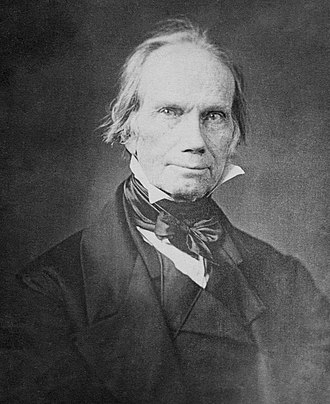
Chancellor Henry Clay struggles to find support for the new constitutional amendment. The Republican Party begins to be the loudest voice for states' rights, while the Unionist Party is split between supporters and oppositions.

Chancellor Clay ammasses support for the Abolition Amendment as he attempts to compromise. Clay agrees to the purchase of land from Mexico in order to gain support of the Unionist Party. The Republican Party doesn't agree to either, as they believe Clay would use the land for his American System proposals, which would see the rise of Libertarian support in the new states. Republicans continue to argue for popular sovereignty as opposed to emancipation.

Brazil ends the slave trade. This does not emancipate the slave population.
The Mexican Purchase plan sees the support of King Augustus II. Augustus appoints delegates to Emperor Vicente I of Mexico. Clay begins to lose the support of the Libertarian Party as concerns of the issue with Texas' apprehension to abolition come to head.

Augustus II and Vicente I come to an agreement. Mexico agrees to sell its northern, sparsely populated regions. This includes Texas, which had been growing discontent with the Mexican monarchy. In return, America agrees to forgive all Mexican debt from their revolution, as well as $3 million, and Augustus issuing a formal recognition of the House of Guerrero. This was done after the prevailing belief it would help with the legitimacy of the Mexican monarchy, and thus the political stability. Mexico begins to become economically stable, but political stability receives only minor change.
Crown Prince William and Princess Ana welcome their fourth child, Princess Sophia.

The Mexican Purchase is ratified by the governments of the American Kingdom and the Mexican Empire. However, the purchase is immediately opposed by the territory of Texas as they believe both nations infringed on their believed right to own slaves. As slavery was still legal at the time in America, Texas cited the proposed emancipation amendment as their evidence. Before the ratification of the Purchase is finalized, Texas declares itself an independent republic.

Texas begins open revolution against the amendment. Volunteers from many states join them, with few state government come out in support. Chancellor Clay and King Augustus begin to mobilize the federal army.

The Texas Rebellion ends with the total defeat of the Texan rebels. The new Texan government is compelled to ratify the new amendment, while the territory becomes a Republican stronghold thereafter.
Chancellor Clay is made a Duke for his leadership, but suffers support due to popular opinion seeing his chacelory as the cause of the war.
During the election of the same year, no one party receives the majority. Daniel Webster of the Unionist Party wins the race in the Assembly after bargaining with the new Whig Party.
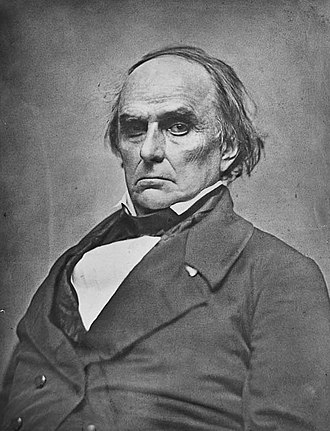
Chancellor Daniel Webster supports a measure to compensate previous slave holders as interpreted by the Takings Clause of the Fifth Amendment, as well as inspiration from British abolition in their colonies. The support for the Unionist government falters among Libertarians under the decision.
Webster also angered many Republicans and Whigs by using federal troops for integration and enforcement of federal laws in former rebellious territories. Though this act would require royal consent, King Augustus II becomes very ill, and allows for the Chancellor and the Crown Prince to do much of the governing.


William is crowned as King of America. He did so wearing the sword of his uncle, Louis Ferdinand, a symbol that had become tradition.
Webster pressures Congress to downsize Texas so as to limit its economic capabilities. Everything south of the Red River and East of the Guadalupe River is designated as Texas, while west of the Guadalupe is the state route of Medina. North of the Red River is the Oklahoma Territory. While the notion is accepted by slim margins, it receives mixed support from the Unionist Party and the newly formed Whig Party, the latter of which wishing to capitalize on increased support from the other regions into statehood.
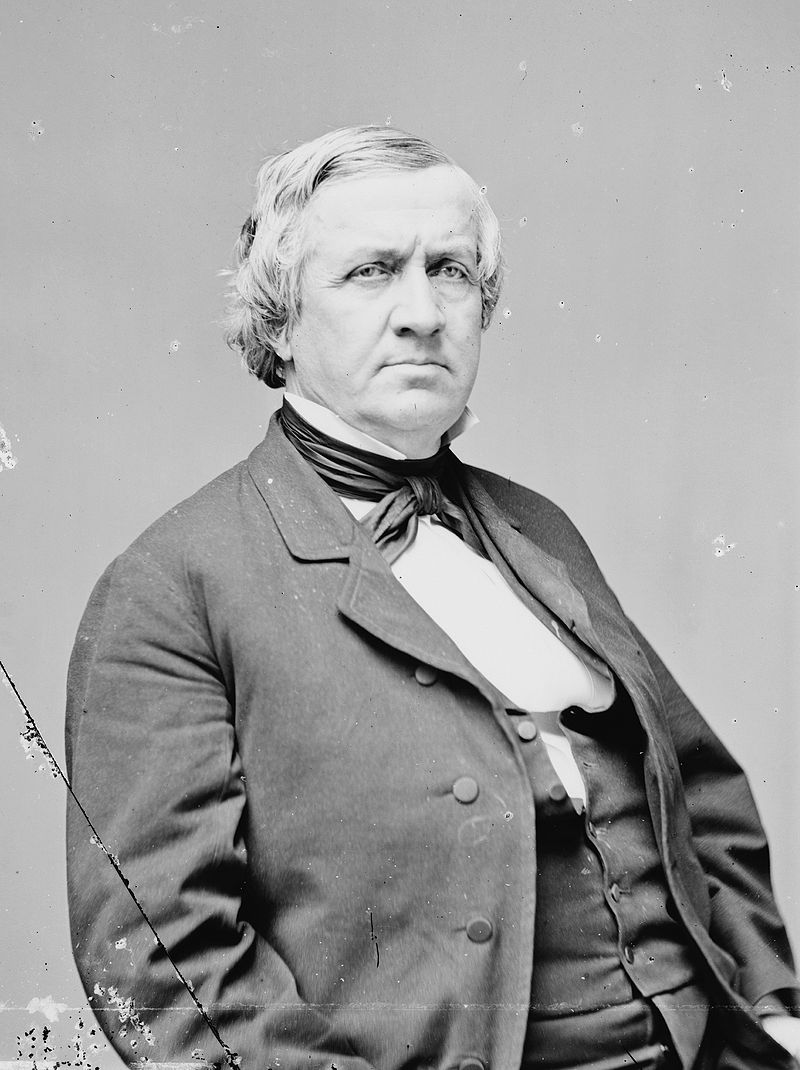
Despite calls for the removal of federal forces from southern states, Chancellor Hale and King William I refuse to do so. Inversely, Hale authorizes further authority to the troops in order to put down rising contention against abolition. Such groups had been targeting the homes of former slaves and newly elected black politicians.

William I, King of America, agrees to a marriage between his daughter, Maria, and the Emperor of Mexico, Vicente II.
Congress passes the Amendments granting citizenship and the right to vote to free-persons of color. Nicknamed the "Gunpoint Amendments", the previously rebellious states still lacked what was perceived as duly elected representation, and thus were subsequently ratified through a forced vote of federally appointed officials. Premier John C. Fremont forces the vote in the Senate, where objected votes by those rebellious states were excluded.
Franklin Pierce of the Whig Party wins the chancellery on the idea of claiming Cuba as a slave province.
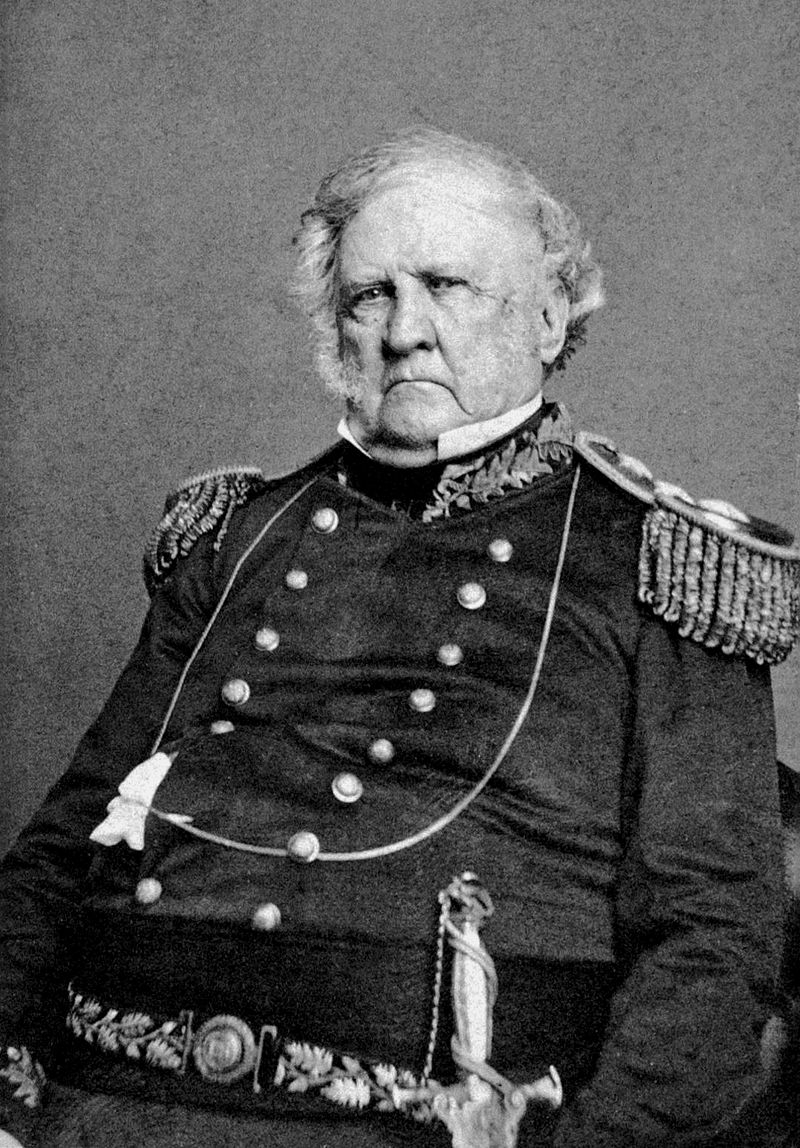
Chancellor Sir Winfield Scott appoints Horace Mann to the newly created Office of Education, seeking to reform the nations educational system based on the Prussian Method.
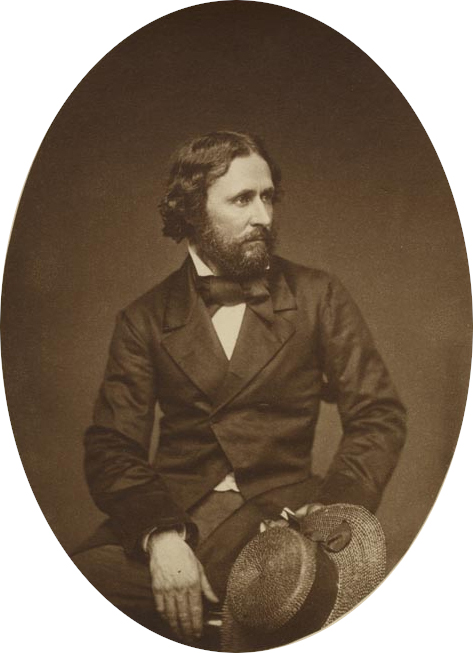
Emperor Vicente II of Mexico is executed by the Mexican people along with most of the Imperial Family, including Empress Maria. The only survivor is Miguel, the youngest child who was studying abroad during the revolt. King William I of America is infuriated by the death of his daughter, and demands a declaration of war on the provisional government. Congress approves.
Comments